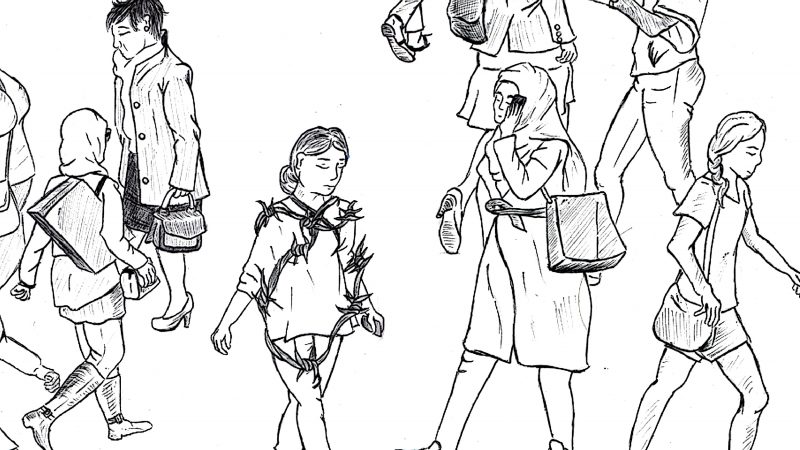Amy’s story
Amy is 39, lives with her gorgeous pug Blaise and works at Admiral – an endometriosis friendly employer. In Amy’s spare time, she runs an endometriosis support page on Instagram which aims to raise awareness of endometriosis and other conditions associated with endometriosis. Amy is always looking for ways to advocate for those with endometriosis and help in providing a voice for those who continue to go unheard.
Amy, endometriosis, and work

“I started to experience debilitating symptoms when I started my period at 13 years old. My periods were incredibly painful and heavy, to the point that I couldn’t get out of bed or go to school, and standard period products were not enough to capture the flow. I would also experience related bowel issues such as awful cramps in the week up to my period and then a week afterwards. I remember feeling really alone, as none of my friends were suffering like this, and my family (not knowing any better at the time), insisted it was normal. Even though I knew something was wrong, I did not have the information to really understand or communicate what was going on.
This was further compounded by doctors telling me these symptoms were normal and that “I’m not special, I just need to get on with it” – I was made to feel like I was wasting the doctor’s time and that the pain was “all in my head”. Despite this, from the age of 13-18, I kept trying to seek help and was diagnosed with IBS and depression. I started to believe that’s what I was dealing with, because that’s what I was told by medical professionals. However, at my core, I just knew something wasn’t right and it wasn’t IBS, as I was in unmanageable pain every single day.
I struggled to finish university because of how unwell I was, which meant that my career route had to completely change. For a while, I found myself doing jobs that I didn’t really want to do, but my health impacted them too. I always felt at risk of losing my job because of things like sick days and employers not understanding (or even trying to understand) what I was going through. I felt like I couldn’t go for promotions because I’d be overlooked owing to the number of sick days I had taken.
Throughout my entire 20s, as my symptoms were getting worse and my health was declining, I was gaslighted by medical professionals, which in turn meant my employers, and my support network did not believe that anything was wrong with me. I began to miss a lot of work owing to my health. My employers at the time were often rude about the time off I needed and would say I was making it up. They sent me to occupational health who reviewed my files and said the same thing. I tried to explain that I was struggling with my commute to work on public transport because of my symptoms and the impact they were having on me (i.e. I’d be unable to move with pain and getting the urge to suddenly need to find a toilet which was not possible on public transport) but to no avail.
Eventually, I found a career that I really wanted to do, and with more flexible managers and being able to work from home a bit more, I found myself doing really well. However, within 4 years of doing the job (which was very full on), I had to stop – my health at this point had severely declined. At this time, I was living in Manchester and decided it was time to move back home to Cardiff, for more support from my family.
Luckily, I found a job with private health insurance – which, after 25 years of misdiagnosis, finally enabled me to get a diagnosis of endometriosis and adenomyosis – and a female boss that was understanding and empathetic to all that I was experiencing, having experienced health issues of her own. Adjustments were made to help me with certain aspects of my role for when I was experiencing symptoms. For instance, when I was taking minutes in various meetings, I was provided with a Dictaphone, meaning that if I needed to run out, I could just press the record button (catering to my medical needs and decreasing stress as I did not have to worry about catching up on the workload or not being able to go to the toilet when I needed to).
Unfortunately, despite a supportive environment, there were various areas where this was not aligned with their workplace policies. For example, after having three operations within 18 months, I needed a hysterectomy. I was told that I had to go on a sickness performance improvement plan, and I was not allowed another sick day for the next 12 months, despite them knowing I was about to have major surgery. Occupational Health was completely outraged by this, and provided advice as to how my employer could make adjustments to support me in the workplace, but this did not hold much weight against their existing workplace policies.
While all of this was happening, I was going through the interviews at Admiral – usually I would not want to be upfront about any health conditions for fear of being discriminated against, but I knew that Admiral fostered an inclusive environment and had company-wide awareness of endometriosis, so I felt I could be more open and honest. I also felt more comfortable talking about what was going on with my health now that I knew what I was experiencing.
From the start, before I was even offered the job, Admiral was completely supportive. I was offered the job on the day of my surgery and since then, have been fully supported and cared for by the company. From sending me flowers during my recovery (before I had even started or accepted the role!), to assessing and providing any adjustments I may need, Admiral have been fantastic. Such adjustments have involved providing work equipment that will ease my pain from nerve damage, and completely flexible working (enabling me to make medical appointments and work around my health issues). Feeling heard and listened to, in a supportive work environment which acknowledges the severity of endometriosis and aligns their policies with this, is transformative.
Working at a company that is so supportive of my health experiences and is an endometriosis friendly employer is very different to anything that I had experienced previously. When it comes to dealing with health issues in the workplace, support, adjustments, and policies that uphold these things should be the norm, not the rarity.”
Amy’s top tips for managing symptoms in the workplace
Speak to someone, if possible
Endometriosis can be a lonely condition as the symptoms we experience can be embarrassing to talk about, especially to those who don’t have endometriosis. However, the right people to talk to are out there, and can help support you or empower you with the knowledge to further support yourself.
Create an endometriosis or pain toolkit
What is your go to painkiller (i.e., medication or tens machines), clothing item(s) or symptom management techniques? It’s a good idea to make a list and have these things already prepared for when you need them.
Check your workplace policies
It’s good to equip yourself with the knowledge of what is available to you within the workplace. Sometimes and unfortunately, employers may not realise what can be put in place until you bring it to their attention.
Amy’s top tips for employers
Mandatory manager training on female health issues
All managers should be equipped with knowledge on how to support women and those assigned female at birth (AFAB) at different stages of their lives (i.e., in menopause, pregnancy, hormonal treatment) as well as in times of ill health. Often, women and those AFAB face additional barriers to receiving appropriate healthcare in comparison to men. This can impact very negatively on every area of their lives.
Make sure your workplace policies align with your actions
If you have excellent workplace policies in place to make sure a colleague with ill health is supported, make sure to enact them. Similarly, whilst it is brilliant if staff members such as managers are supportive and strive to make adjustments, your policies should align with this to allow it to happen!
Ideally, private healthcare should be offered but, if this is not possible, appropriate support / resources for those on waiting lists should be made available to employees.
Providing comfortable spaces where someone can go
These can be incredibly helpful for employees who just need a private or quiet space to get their pain or other symptoms under control.

